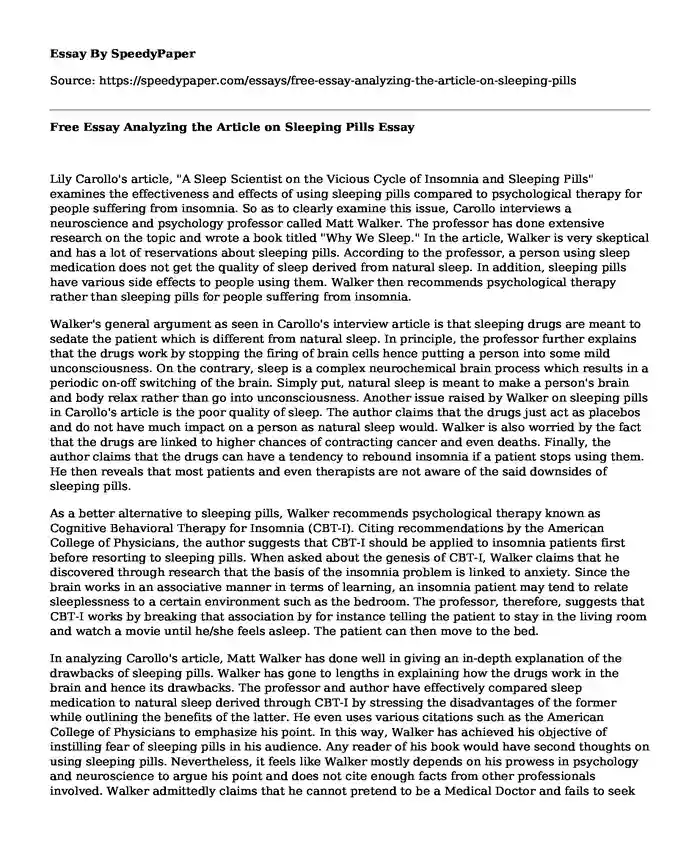
| Type of paper: | Essay |
| Categories: | Counseling Drug |
| Pages: | 3 |
| Wordcount: | 643 words |
Lily Carollo's article, "A Sleep Scientist on the Vicious Cycle of Insomnia and Sleeping Pills" examines the effectiveness and effects of using sleeping pills compared to psychological therapy for people suffering from insomnia. So as to clearly examine this issue, Carollo interviews a neuroscience and psychology professor called Matt Walker. The professor has done extensive research on the topic and wrote a book titled "Why We Sleep." In the article, Walker is very skeptical and has a lot of reservations about sleeping pills. According to the professor, a person using sleep medication does not get the quality of sleep derived from natural sleep. In addition, sleeping pills have various side effects to people using them. Walker then recommends psychological therapy rather than sleeping pills for people suffering from insomnia.
Walker's general argument as seen in Carollo's interview article is that sleeping drugs are meant to sedate the patient which is different from natural sleep. In principle, the professor further explains that the drugs work by stopping the firing of brain cells hence putting a person into some mild unconsciousness. On the contrary, sleep is a complex neurochemical brain process which results in a periodic on-off switching of the brain. Simply put, natural sleep is meant to make a person's brain and body relax rather than go into unconsciousness. Another issue raised by Walker on sleeping pills in Carollo's article is the poor quality of sleep. The author claims that the drugs just act as placebos and do not have much impact on a person as natural sleep would. Walker is also worried by the fact that the drugs are linked to higher chances of contracting cancer and even deaths. Finally, the author claims that the drugs can have a tendency to rebound insomnia if a patient stops using them. He then reveals that most patients and even therapists are not aware of the said downsides of sleeping pills.
As a better alternative to sleeping pills, Walker recommends psychological therapy known as Cognitive Behavioral Therapy for Insomnia (CBT-I). Citing recommendations by the American College of Physicians, the author suggests that CBT-I should be applied to insomnia patients first before resorting to sleeping pills. When asked about the genesis of CBT-I, Walker claims that he discovered through research that the basis of the insomnia problem is linked to anxiety. Since the brain works in an associative manner in terms of learning, an insomnia patient may tend to relate sleeplessness to a certain environment such as the bedroom. The professor, therefore, suggests that CBT-I works by breaking that association by for instance telling the patient to stay in the living room and watch a movie until he/she feels asleep. The patient can then move to the bed.
In analyzing Carollo's article, Matt Walker has done well in giving an in-depth explanation of the drawbacks of sleeping pills. Walker has gone to lengths in explaining how the drugs work in the brain and hence its drawbacks. The professor and author have effectively compared sleep medication to natural sleep derived through CBT-I by stressing the disadvantages of the former while outlining the benefits of the latter. He even uses various citations such as the American College of Physicians to emphasize his point. In this way, Walker has achieved his objective of instilling fear of sleeping pills in his audience. Any reader of his book would have second thoughts on using sleeping pills. Nevertheless, it feels like Walker mostly depends on his prowess in psychology and neuroscience to argue his point and does not cite enough facts from other professionals involved. Walker admittedly claims that he cannot pretend to be a Medical Doctor and fails to seek views of the doctors and pharmacists in arguing his point. All in all, the interview seemed well informed on Walker's book and did well on tackling every issue on the topic.
Cite this page
Free Essay Analyzing the Article on Sleeping Pills. (2022, May 27). Retrieved from https://speedypaper.com/essays/free-essay-analyzing-the-article-on-sleeping-pills
Request Removal
If you are the original author of this essay and no longer wish to have it published on the SpeedyPaper website, please click below to request its removal:
- What Are General Education Competencies? The Answer in This Free Essay
- Free Essay about Political System
- Health Essay Example
- Government Vision Essay Sample
- Essay Sample on Residents' Attitudes Toward Tourism and Seasonality
- Free Essay Explaining Lower Latino Violent Crime Rates than Those Committed by African Americans
- The New Deal Programs - Free Essay Sample
Popular categories




